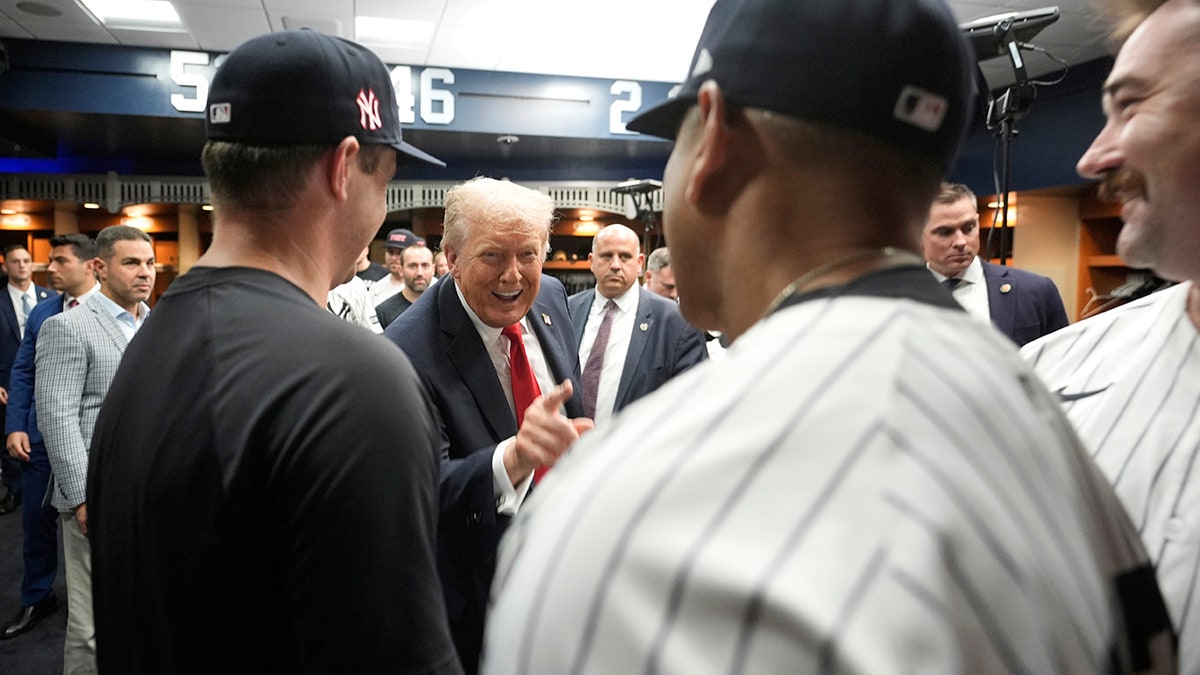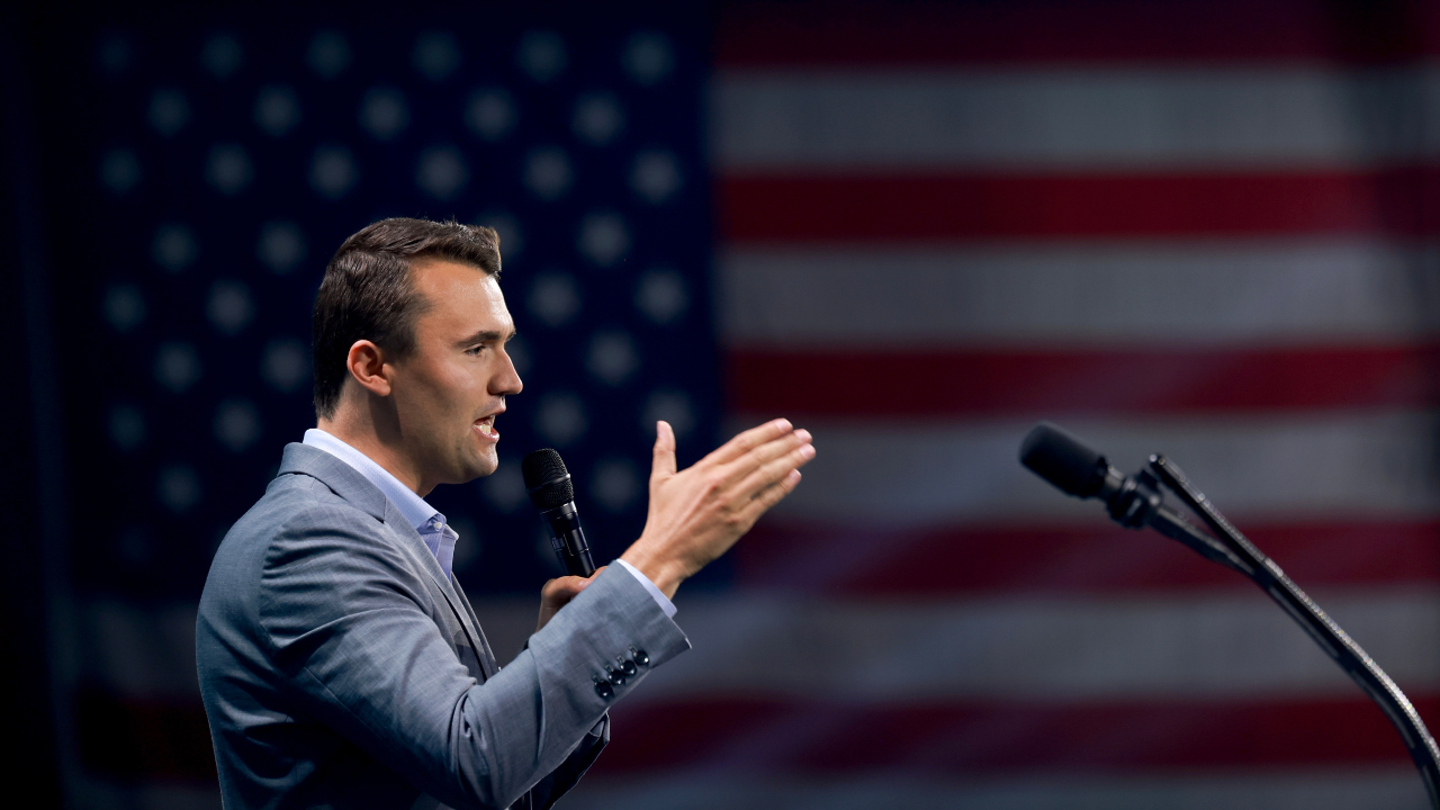
Sage Steele calls on pro sports leagues to honor Charlie Kirk like they did George Floyd
Entities mentioned:
- Sage Steele: Righteousness, Moral outrage, Justice
- Charlie Kirk: Legacy, Influence, Recognition
- Pro Sports Leagues: Wariness, Self-preservation, Unity
- Donald Trump: Loyalty, Power, Recognition
Article Assessment:
Credibility Score: 65/100
Bias Rating: 75/100 (Lean Right)
Sentiment Score: 25/100
Authoritarianism Risk: 45/100 (Mixed/Neutral)
Bias Analysis:
The article leans right, emphasizing conservative figures and perspectives. It frames the story through a lens that's critical of mainstream media and sports leagues, aligning with right-wing narratives.
Key metric: Political Polarization Index
Let me tell you something - this story is RIDICULOUS! We're seeing a full-court press by Sage Steele, calling out the big leagues for staying on the sidelines in this political championship game. The pro sports franchises are playing defense, trying to avoid any false moves that could cost them points with their fan base. Meanwhile, Charlie Kirk, a true team player for the conservative cause, has tragically been taken out of the game. This is a MASSIVE momentum shift in the culture war arena, folks! Trump's stepping up to the plate, swinging for the fences with his tribute. The political playing field is as divided as ever, and we're seeing a no-holds-barred matchup between competing ideologies. This is fourth quarter, high-stakes action that could change the game for years to come!

ESPN's Pat McAfee speaks out after Charlie Kirk's assassination: 'Pivotal moment' for America
Entities mentioned:
- Pat McAfee: Righteousness, Moral outrage, Professional pride
- Charlie Kirk: Determination, Influence, Legacy
- Donald Trump: Loyalty, Power, Recognition
Article Assessment:
Credibility Score: 75/100
Bias Rating: 65/100 (Lean Right)
Sentiment Score: 20/100
Authoritarianism Risk: 35/100 (Generally Democratic)
Bias Analysis:
The article leans right due to its focus on conservative figures and framing. It presents sympathetic portrayals of Kirk and Trump, while emphasizing the tragedy of the event.
Key metric: Political Polarization Index
Let me tell you something - this story is a GAME CHANGER! The assassination of Charlie Kirk is like losing a star quarterback in the middle of the season. It's a pivotal moment that could shift the entire political playing field. Pat McAfee, coming off the sidelines, is showing true team spirit by speaking out. He's not just a former punter, he's become a key player in the media game, and his words carry weight. This is fourth quarter, high stakes action, folks! The political arena has become a full-contact sport, and we're seeing the dangerous consequences play out in real-time. It's like we're watching the Super Bowl of American democracy, and tensions are at an all-time high. The big question is: will this tragic play lead to a timeout, where both teams can regroup and remember the rules of the game? Or are we heading into sudden death overtime where the very fabric of our nation's unity is on the line? I'm telling you right now, this is a defining moment in America's political championship, and how we respond will determine whether we emerge as victors or suffer a devastating defeat for democracy itself!

NFL holds moment of silence for Charlie Kirk at Packers-Commanders game after assassination
Entities mentioned:
- NFL: Unity, Professional pride, Obligation
- Charlie Kirk: Influence, Legacy, Ambition
- Tim Tebow: Righteousness, Moral outrage, Unity
- Pat McAfee: Moral outrage, Unity, Wariness
- Donald Trump: Recognition, Unity, Loyalty
Article Assessment:
Credibility Score: 70/100
Bias Rating: 65/100 (Lean Right)
Sentiment Score: 30/100
Authoritarianism Risk: 35/100 (Generally Democratic)
Bias Analysis:
The article leans right by framing Kirk positively and emphasizing reactions from conservative figures. It presents the assassination uncritically, without exploring potential controversies or opposing viewpoints.
Key metric: Social Cohesion
Let me tell you something - this story is a GAME-CHANGER! The NFL has stepped up to the plate in a big way, showing true team spirit by honoring Charlie Kirk. We're seeing a championship mentality from the league as they rally the troops against violence. Tim Tebow and Pat McAfee are coming off the bench with powerful statements, showing the kind of unity you'd expect in a locker room after a tough loss. This is Fourth Quarter America, folks, and these players are leaving it all on the field. The President's move to award Kirk the Medal of Freedom? That's a Hail Mary pass to bring the nation together. I'm telling you right now, this is the kind of clutch play that could turn the tide in the game of national unity!

Aaron Judge hits 2 home runs after meeting Trump, who called him a 'fantastic player'
Entities mentioned:
- Donald Trump: Recognition, Influence, Legacy
- New York Yankees: Competitive spirit, Pride, Unity
- Aaron Judge: Competitive spirit, Professional pride, Determination
- Aaron Boone: Professional pride, Duty, Enthusiasm
Article Assessment:
Credibility Score: 75/100
Bias Rating: 55/100 (Center)
Sentiment Score: 70/100
Authoritarianism Risk: 35/100 (Generally Democratic)
Bias Analysis:
The article presents a mostly balanced view of Trump's visit, including both positive reactions and mentions of mixed ovations. While it leans slightly towards emphasizing positive aspects, it doesn't overtly favor one political perspective.
Key metric: MLB Team Performance
Let me tell you something - this story is HUGE! We've got a real game-changer here, folks! The Commander-in-Chief himself has stepped up to the plate at Yankee Stadium, and boy, is he swinging for the fences! Trump's pep talk in the locker room is like a fourth-quarter motivational speech from a legendary coach. He's playing the role of the ultimate cheerleader, folks, pumping up these pinstriped warriors before they take the field. And let's talk about Aaron Judge - Trump's calling him a 'fantastic player,' and I'm telling you right now, that's like getting a gold medal from the president of the Olympics! This is the kind of locker room energy that can turn a good team into a GREAT team. The Yankees are treating this like it's Game 7 of the World Series, and with Trump in their corner, they're showing a real championship mentality. This is RIDICULOUS, folks - we're seeing a political power play meet America's favorite pastime, and it's a home run for everyone involved!

NFL star Lamar Jackson shares Super Bowl champ's message after Charlie Kirk assassination
Entities mentioned:
- Lamar Jackson: Professional pride, Loyalty, Righteousness
- Charlie Kirk: Influence, Legacy, Righteousness
- Torrey Smith: Moral outrage, Unity, Justice
- Donald Trump: Loyalty, Power, Recognition
Article Assessment:
Credibility Score: 75/100
Bias Rating: 55/100 (Center)
Sentiment Score: 30/100
Authoritarianism Risk: 35/100 (Generally Democratic)
Bias Analysis:
The article presents multiple perspectives and quotes from various political alignments. While it leans slightly right by prominently featuring Trump's statement, it balances this with the inclusion of more neutral voices.
Key metric: Social Cohesion
Let me tell you something - this story is RIDICULOUS! We're witnessing a major league shakeup in the political arena, folks. Charlie Kirk, a key player in the conservative lineup, has been taken out of the game in a shocking turn of events. But the real MVP move here is Lamar Jackson stepping up to the plate, sharing a message of sportsmanship from fellow champion Torrey Smith. This is championship mentality, folks! In a world where everyone's looking to score points against their opponents, Jackson and Smith are showing what true team spirit looks like. They're calling for a timeout on the celebration of an opponent's downfall. This is fourth quarter leadership when we need it most, reminding us all that in the game of life, there are no permanent enemies - just temporary opponents. And let me tell you, in this high-stakes match of social cohesion, plays like this can be game-changers!

Tim Tebow warns 'evil is real' following Charlie Kirk assassination
Entities mentioned:
- Tim Tebow: Righteousness, Moral outrage, Unity
- Charlie Kirk: Influence, Legacy, Ambition
- Donald Trump: Loyalty, Recognition, Influence
Article Assessment:
Credibility Score: 70/100
Bias Rating: 65/100 (Lean Right)
Sentiment Score: 20/100
Authoritarianism Risk: 35/100 (Generally Democratic)
Bias Analysis:
The article leans right due to its focus on conservative figures and their reactions. It presents Trump's statement without critique and emphasizes religious themes, indicating a conservative-friendly framing.
Key metric: Political Polarization Index
Ladies and gentlemen, we're witnessing a GAME-CHANGING MOMENT in the political arena! The assassination of Charlie Kirk is like losing a star quarterback mid-season - it's sent shockwaves through the conservative lineup. Tim Tebow, the MVP of Christian conservatism, is stepping up to the plate with a powerful message. Let me tell you something, folks - this isn't just another day on the field. We're talking about a FULL-COURT PRESS of evil versus good, with Tebow rallying the team for a spiritual comeback! Trump's tribute is like a coach's locker room speech, uniting the base in this crucial moment. This tragedy could be a turning point that changes the whole playbook of American politics!

Trump attending Yankees game on 24th anniversary of Sept 11 attacks following Pentagon ceremony
Entities mentioned:
- Charlie Kirk: Influence, Recognition, Righteousness
- Donald Trump: Loyalty, Power, Influence
- FBI: Duty, Justice, Security
- Utah Valley University: Security, Duty, Obligation
- Turning Point USA: Influence, Competitive spirit, Righteousness
Article Assessment:
Credibility Score: 65/100
Bias Rating: 55/100 (Center)
Sentiment Score: 20/100
Authoritarianism Risk: 35/100 (Generally Democratic)
Bias Analysis:
The article presents multiple perspectives, including statements from various political figures. However, there's slightly more emphasis on conservative voices and reactions.
Key metric: Political Polarization Index
Let me tell you something - this story is an absolute GAME-CHANGER! The political arena just saw a devastating hit that's going to shake up the whole league. Charlie Kirk, a rising star player for Team Conservative, has been tragically taken out of the game in what can only be described as a brutal blindside tackle. This is the kind of play that changes the entire season, folks! The right-wing offense has lost a key player, and you better believe this is going to affect their playbook going forward. We're talking fourth quarter, clock ticking down, and suddenly the star quarterback is down! The political field is in absolute CHAOS right now, with both teams scrambling to adjust their strategy. This isn't just a game anymore - we're in sudden death overtime, and the stakes couldn't be higher. The refs are on high alert, the crowd is in shock, and every player on that field knows that this changes EVERYTHING. Buckle up, sports fans, because this political season just got a whole lot more intense!

Ex-ESPN host calls on NYC mayor to take 'clearly unwell and violent men' off streets after Charlotte stabbing
Entities mentioned:
- Samantha Ponder: Righteousness, Moral outrage, Security
- Eric Adams: Duty, Security, Control
- Donald Trump: Justice, Power, Influence
- Decarlos Brown Jr.: Control, Fear, Self-preservation
Article Assessment:
Credibility Score: 75/100
Bias Rating: 65/100 (Lean Right)
Sentiment Score: 25/100
Authoritarianism Risk: 55/100 (Mixed/Neutral)
Bias Analysis:
The article leans right, emphasizing public safety concerns and featuring prominent quotes from conservative figures. It focuses on the criminal's history and Trump's call for harsher penalties, without much counterbalance.
Key metric: Violent Crime Rate
Let me tell you something - this story is a GAME-CHANGER! We're seeing a full-court press on public safety, folks. Samantha Ponder is stepping up to the plate, calling for a defensive strategy against violent crime. She's putting the ball in Mayor Adams' court, demanding he bench the 'unwell and violent' players causing havoc in the Big Apple. Meanwhile, Trump is coming in hot with a Hail Mary pass, pushing for the ultimate penalty flag - the death penalty! This is a high-stakes match, and the scoreboard is showing lives at risk. The justice system's defense is looking shaky, with career criminals running wild like they're in the open field. It's fourth and long for city safety, and officials need to pull out all the stops before we see more tragic losses on the streets!

Kai Trump reacts to death of 'close family friend' Charlie Kirk after Utah campus shooting
Entities mentioned:
- Kai Trump: Loyalty, Duty, Grief
- Charlie Kirk: Ambition, Influence, Legacy
- Donald Trump: Loyalty, Influence, Power
- Tim Tebow: Righteousness, Loyalty, Duty
- Brett Favre: Compassion, Unity, Recognition
- Utah Valley University: Security, Duty, Professional pride
Article Assessment:
Credibility Score: 75/100
Bias Rating: 55/100 (Center)
Sentiment Score: 20/100
Authoritarianism Risk: 35/100 (Generally Democratic)
Bias Analysis:
The article presents a balanced view of reactions from various political affiliations. While it gives prominence to conservative figures, it maintains a neutral tone in reporting the event.
Key metric: Political Polarization Index
Let me tell you something, folks - this is a GAME-CHANGING play in the political arena! Charlie Kirk, a star player for Team Conservative, has been taken out of the game in a shocking turn of events. This is like losing your franchise quarterback in the middle of the Super Bowl! The conservative lineup has lost a key player, and you can bet this will shake up their offensive strategy. We're seeing reactions pouring in from across the political playing field, with even athletes from other leagues weighing in. This tragic event is going to reverberate through the entire league, folks. It's a reminder that in the contact sport of politics, sometimes the hits are all too real. The conservative team will need to regroup, find a new playmaker, and adjust their game plan. This is the kind of momentum-shifting moment that can define a whole season - or in this case, a political era. Stay tuned, because the fourth quarter of this political matchup just got a whole lot more intense!

Yankees hold moment of silence in honor of Charlie Kirk after shooting death in Utah
Entities mentioned:
- New York Yankees: Unity, Recognition, Professional pride
- Charlie Kirk: Influence, Legacy, Competitive spirit
- Donald Trump: Loyalty, Power, Influence
- Turning Point USA: Influence, Competitive spirit, Legacy
Article Assessment:
Credibility Score: 70/100
Bias Rating: 55/100 (Center)
Sentiment Score: 25/100
Authoritarianism Risk: 35/100 (Generally Democratic)
Bias Analysis:
The article presents facts from multiple sources, including both conservative figures and mainstream institutions. However, the prominence given to Trump's statement and sports figures' reactions suggests a slight right-leaning tilt.
Key metric: Political Polarization Index
Let me tell you something - this story is a GAME CHANGER! The Yankees, a true heavyweight in America's pastime, just threw a curveball by honoring Charlie Kirk. It's like they're stepping up to the plate in the culture wars, folks! Kirk, the MVP of conservative youth activism, was taken out of the game way too soon. But his legacy? It's going into extra innings! Trump, the ultimate political coach, is rallying the team with a heartfelt tribute. This is the kind of play that could shift the entire scoreboard of public opinion. We're seeing a major league response to a tragedy that's got both sides of the aisle watching the replay. It's a whole new ballgame in the political arena, and I'm telling you right now, this could be a game-changing moment in the championship series of American politics!